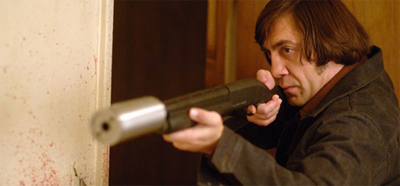It’s a funny world. But it has always been a funny world and it’s arrogant to presume that the world waited until we got here to go and get itself in a mess. Sure, some of us carry the fire off into that night, but it’s a very cold and very dark night and all we have is faith that there is an even greater fire out there waiting for us. No Country For Old Men is a stunning film – an odd fusion of the Coen Brothers with Cormac McCarthy which manages to say a hell-of-a-lot without weighing itself down with too much exposition or dialogue. It’s a great film which realy stands out even amongst the Coens’ already-impressive filmography.

Yes, it's a silencer. On a shotgun.
The plot – as much as there is one – follows the $2m stash that disappears from a drug buy gone wrong, thoiugh to describe it as such does an injustice to the movie. It’s more a story about three men with three very different views. Tommy Lee Jones is great as a law man and passive observer of all the carnage – quiet and carefully considered, he’s a lot smarter than his country persona would have you believe. Josh Brolin is the local who stumbles upon the briefcase and finds himself on the run with it. Brolin has the charisma and presence of a charming leading man, but enough of a stride in his step and smirk on his face to let us know that there’s more to him than meets the eye. The real standout of the film is Javier Bardem as Anton Chigurh, the sociopathic hitman who is like a force of nature. One character jokingly compares him to the bubonic plague, and it’s more than a little apt.
Chigurh is a one-man force of nature, who dispassionately takes lives – acting as if his compelled to do so, either by his own sense of what is due or the randomness of a coin toss. There’s little passion in what he does (though he does seem to particularly enjoy an early murder) – it seems he would kill as easy as look at some people (at one point taking a life because he couldn’t be bothered jumpstarting his car). When confronted with him, people are frozen and unsure quite how to react. No one stands up to him during the film – not necessarily because they are afraid, but because they don’t really understand what is facing them.
The Coens make spectacular use of their surroundings, the Texas desert spanning down to Mexico – a place where nothing seems to thrive, there is only death. A hostile environment to stalk your prey across. The film is nominally set in 1980, with the Vietnam War casting a (mostly unseen) shadow across events, but you’d be forgiven for not noticing the minor period touches like clothing and car models. It could take place in those locations now and little would have changed. Indeed, as one character observes late in the movie, the events of the film could even have taken place in the last century without anyone noticing. Human nature seldom changes – there have been people like Chigurh before and there will be people like Chigurh again (despite however distracted we may get by funny hair colours and piercings).
As one would expect from a Coen Brothers film the casting is superb. The three leads all make their roles memorable (though Bardem does dominate discussion of the film with his creepy sociopath) and they are ably supported by actors like the emerging Kelly Macdonald and the severely underrated Woody Harrelson as a bounty hunter Carson Wells. Harrelson is an interesting fourth wheel (so to speak), and it’s difficult to place his character in the context of the film. He is clearly better educated than any of the three leads – he is described as having lived “something of a charmed life” and presumes that Llewelyn doesn’t know what a transponder is – and seems cleaner cut and smoother, if not suaver. Still, he has served in war and (presumably) been greatly affected by it. Still, he’s out of place among the more primative forces at work, with his tailored suits and his witty observations, and his methods of negotiation are sorely ineffective – Chigurh offers a deep insight into both characters as, in the midst of a confrontation, he wonders what good were Wells’ rules if they brought him here, into this?
It’s a grand and stately epic that isn’t afraid of silence and doesn’t feel the need to blubber and bluster – the characters that do well here get by on actions rather than words. It says something that the Coens can rely on each lead to carry several minutes of silent screentime at any given moment. It’s very odd that another writer’s work should suit the duo so well – they are long renowned for their unique approach to screenwriting – perhaps McCarthy offered them a solid foundation to build their own usual themes and questions upon. There are undeniably some pacing and plotting differences from the normal style of the brothers, but the tones and themes synche up perfectly. The movie hits on the same points which I would expect a Coen brothers film to hit.
There’s really no way not to recommend this solidly thoughtful and considerate drama. It is insightful, graceful and stately. It doesn’t insist upon itself or its own creativity, instead savouring the moments that it can create.
Filed under: Non-Review Reviews | Tagged: adaptation, anton chigurh, best picture, best picture oscar, book, coen brothers, cormac mccarthy, drama, film, javier bardem, josh brolin, Movie, Movies, no country for old men, non-review review, review, the coen brothers, thriller, tommy lee jones, western, woody harrelson |




















Leave a comment